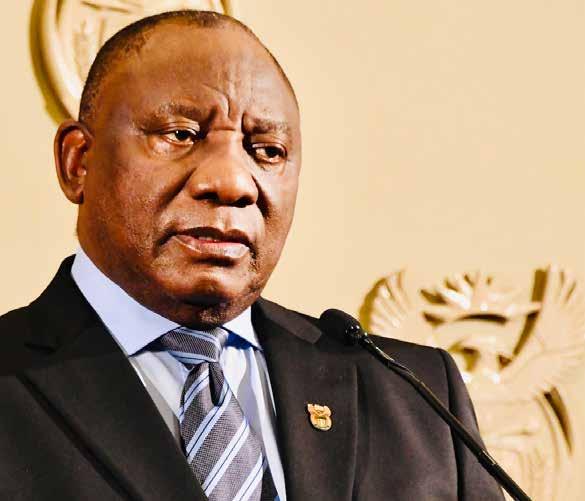
4 minute read
Civil society key to national development – President Ramaphosa
District Development
Model is key to service delivery
Advertisement
Minister in the Presidency, Mondli Gungubele, says the District Development Model (DDM) is critical to the seamless and speedy delivery of services to communities.
Minister Gungubele was speaking at the Sedibeng DDM Presidential Imbizo – led by President Cyril Ramaphosa. He explained that early into his tenure in the highest office, President Ramaphosa recognised the need for all three spheres of government to work together to ensure seamless delivery of services.
“When there is seamlessness, when we work together, the projects are delivered in a speedier manner, in a less costly manner [and] in a more accountable manner. The President took a view that all spheres of government [must] come and work together in a seamless way [and] work together with society, business labour and all stakeholders in a seamless way. [That is the] DDM,” Minister Gungubele said.
The Minister acknowledged that government has identified several service delivery and bulk infrastructure problems in the Sedibeng District that must be addressed urgently. “There’s a lot of painful things that we have witnessed [in Sedibeng], there are also a lot of good things that we have come across. The President is here so that if there are gaps we go back and relevant leaders come back to correct those.”
Gauteng Premier David Makhura said the economy of the area needed to be reignited and revealed that plans were under way to ensure that this is achieved.
“We want the President and his cabinet to know that the economy of the Vaal is in serious trouble. We need national government – not just the province – to help us revive and rebuild this economy. The unemployment [rate] in Sed-
ibeng is 64%. This economy of the Vaal needs decisive regeneration and decisive intervention,” said Makhura.
Service delivery and unemployment
Residents of the Sedibeng District Municipality highlighted housing, sewerage, poor service delivery and unemployment as some of the key areas that government should urgently address to improve their lives.
Responding to questions and challenges raised by the residents, President Ramaphosa said although the district and the country as a whole face challenges, government is determined to resolve them.
“As a country we have many challenges but these challenges are being addressed. The one challenge that really stood out was the sewerage that was just flowing into the Vaal river. I’m glad to hear that this challenge is being addressed on an ongoing basis and Minister [of Water Senzo] Mchunu is addressing this,” he said.
Turning to the high unemployment rate in the district, the President told the gathering that the Vaal Special Economic Zone (SEZ), is pivotal to the revitalisation of industry and consequently create more employment of people in Sedibeng.
By far, unemployment is the biggest challenge. The Gauteng government has ambitious plans to revitalise Sedibeng by developing agriculture, logistics, tourism and industries. These plans are pivoted around the Vaal SEZ, which we have heard has the potential of creating up to 170 000 jobs over the next few years.
“That is a serious number of jobs that will be created right here in Sedibeng,” he said.

Revamping hostels
On housing, President Ramaphosa said the Human Settlements Department – which has seven mega projects in the area – will look into complaints heard from people living in hostels.
The President was firm with his assessment of service delivery not only in the Sedibeng District but in local municipalities throughout the country.
“Our municipalities must pay attention to what needs to be done so that our people live with dignity. We want to see an improvement in the lives of our people from a service delivery point of view from now on. We cannot, in this place which used to be the industrial hub of the country, allow our people to live in squalor; in a dirty place,” President Ramaphosa said.
The President assured the community that their issues will not be put on the back burner at the end of the launch and said the DDM approach assures that these challenges are properly addressed.
“[The DDM] is a break with the past that we have had and here at local level, at district level, it is aimed at making sure that our communities who have felt neglected in the past are part of the whole process of resolving the challenges as they are properly and fully consulted.
“Ministers keep going back to those areas where there are issues they have to address. This goes to show that we treat these types of engagements with you in this type of Imbizo very seriously and we want to be able to follow up on the issues that you have raised,” President Ramaphosa said.
Cabinet adopted the DDM in August 2019. It is an integrated planning model for cooperative governance, which seeks to be a new integrated, district-based, service delivery approach aimed at fast-tracking service delivery. It also seeks to ensure that municipalities are adequately supported and resourced to carry out their mandate. – SAnews.gov.za










